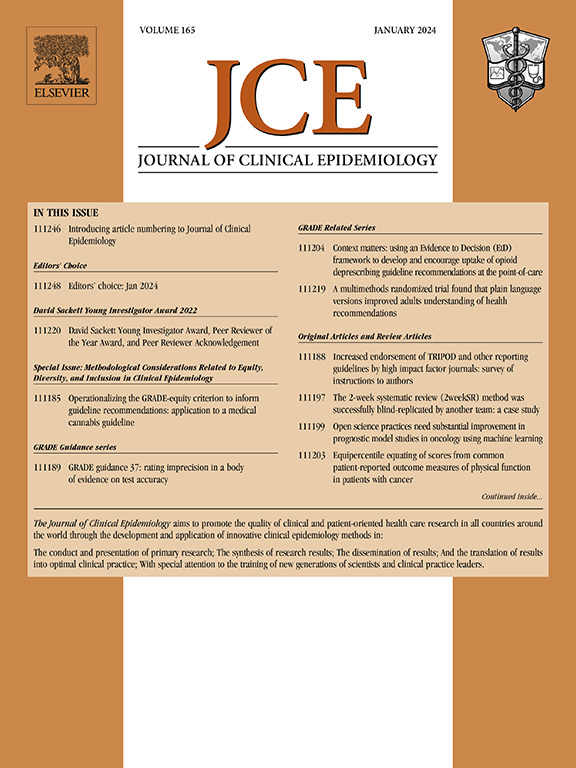Psychometric validation of the pictorial ecological momentary well-being instrument
IF 5.2
2区 医学
Q1 HEALTH CARE SCIENCES & SERVICES
引用次数: 0
Abstract
Objectives
With the growing interest in Ecological Momentary Assessment (EMA) in mental health research, the need for precise and reliable measurement tools has become a pressing issue. However, few candidate instruments have been validated in intensive longitudinal data collection contexts. The present study provides an example of the psychometric validation of measurement instruments designed for EMA, by assessing the psychometric properties of Ecological Momentary Well-being Instrument (EMoWI), the first scale specifically designed to measure momentary well-being.
Study Design and Setting
Participants from the COvid-19 HEalth and Social InteractiOn in Neighborhoods (COHESION) cohort, a general population sample of Canadian adults, who participated in the September 2022 EMA wave, were included. Prompts including the 8 EMoWI items were sent to participants three times a day, over 10 consecutive days. Based on recent recommendations, we combined Classical Test and Item Response theories to assess content, structural, and construct validity, as well as reliability of EMoWI in an intensive longitudinal data collection context.
Results
Two Hundred Ninety adults aged between 19 and 80 were included, representing a total of 7974 prompts over 10 days. Variance decomposition analysis confirmed significant variability in momentary well-being at both the participant and day levels. Multilevel confirmatory factor analysis supported a single factor hypothesis (root mean square error of approximation = 0.074). Internal consistency was high, both at the within- and between-variance level (MacDonald's ω = 0.814 and 0.938, respectively) and we demonstrated longitudinal measurement invariance over time. Variations in mean momentary well-being across subgroups were consistent with our predefined hypotheses, supporting construct validity of EMoWI.
Conclusion
We demonstrated the validity and reliability of EMoWI to measure momentary well-being in intensive longitudinal studies. These results will enhance the accuracy of findings related to well-being in EMA studies and inform the development of evidence-based mental health ecological momentary interventions.
图片生态瞬时幸福量表(EMoWI)的心理计量学验证。
目的:随着生态瞬时评估(EMA)在心理健康研究中的应用越来越广泛,对精确可靠的测量工具的需求已成为一个迫切的问题。然而,很少有候选仪器在密集的纵向数据收集环境中得到验证。本研究通过评估EMoWI(生态瞬时幸福量表)的心理测量特性,为EMA设计的测量工具的心理测量验证提供了一个例子,EMoWI(生态瞬时幸福量表)是第一个专门用于测量瞬时幸福的量表。研究设计和环境:来自加拿大成年人的一般人群样本——COHESION队列的参与者,参与了2022年9月的EMA浪潮。包括八个EMoWI项目在内的提示每天三次发送给参与者,连续10天。基于最近的建议,我们将经典测试和项目反应理论结合起来,在密集的纵向数据收集背景下评估EMoWI的内容、结构和结构效度以及可靠性。结果:包括290名年龄在19至80岁之间的成年人,在10天内总共有7,974个提示。方差分解分析证实,在参与者和日常水平上,瞬时幸福感都存在显著差异。多水平验证性因子分析支持单因素假设(RMSEA = 0.074)。内部一致性很高,在方差内和方差间水平(MacDonald's ω分别= 0.814和0.938),我们证明了纵向测量随时间的不变性。亚组间平均瞬时幸福感的变化与我们预先设定的假设一致,支持EMoWI结构的有效性。结论:我们在深入的纵向研究中证明了EMoWI测量瞬时幸福感的有效性和可靠性。这些结果将提高EMA研究中与幸福感相关发现的准确性,并为基于证据的心理健康生态短暂干预措施的发展提供信息。
本文章由计算机程序翻译,如有差异,请以英文原文为准。
求助全文
约1分钟内获得全文
求助全文
来源期刊

Journal of Clinical Epidemiology
医学-公共卫生、环境卫生与职业卫生
CiteScore
12.00
自引率
6.90%
发文量
320
审稿时长
44 days
期刊介绍:
The Journal of Clinical Epidemiology strives to enhance the quality of clinical and patient-oriented healthcare research by advancing and applying innovative methods in conducting, presenting, synthesizing, disseminating, and translating research results into optimal clinical practice. Special emphasis is placed on training new generations of scientists and clinical practice leaders.
 求助内容:
求助内容: 应助结果提醒方式:
应助结果提醒方式:


